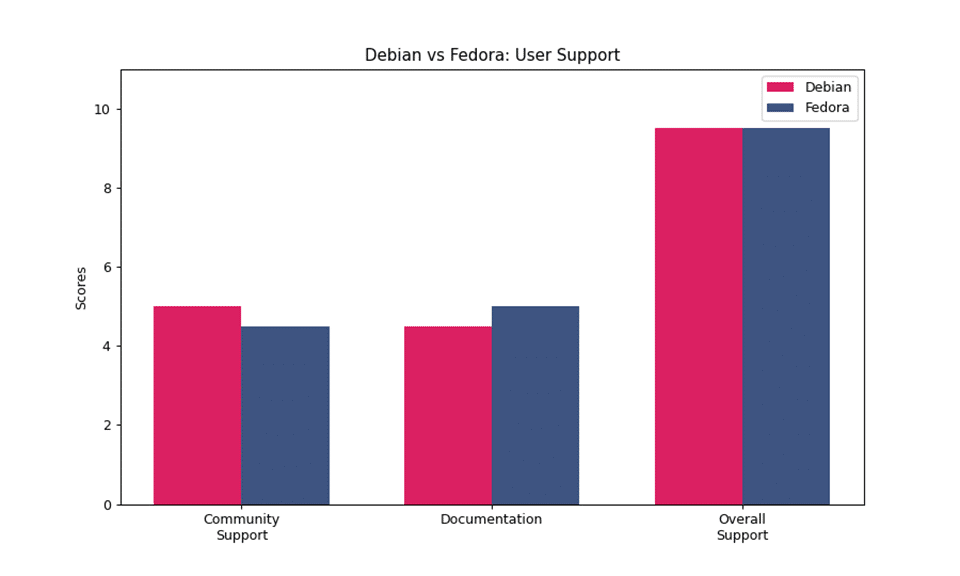Debian Vs. Fedora: Security, Stability, And Speed In Focus

Executive Summary

In the world of Linux distributions, Debian and Fedora stand out as two of the most popular and well-respected options. Both distributions have a long history of providing users with a stable, secure, and performant computing experience. However, there are also some key differences between the two distributions that users should be aware of before making a choice.

-
Debian: Debian is a stable and secure Linux distribution that is perfect for servers and other critical applications. It is known for its conservative approach to software updates, which means that users can be confident that their systems will remain stable and secure. This stability and conservatism makes Debian a particularly good choice for the enterprise environment.
-
Fedora: Fedora is a more cutting-edge Linux distribution that is perfect for users who want the latest and greatest software. It is known for its rapid release cycle, which means that users can get access to the latest software features as soon as they are available. This rapid release cycle makes Fedora a great choice for users who want to be on the bleeding edge of technology.
Introduction
Debian and Fedora are two of the most popular Linux distributions available today. Both distributions have a strong focus on security, stability, and speed. However, there are some key differences between the two distributions that can make one a better choice for your needs than the other.
Security
Security is a top priority for both Debian and Fedora. Both distributions use a variety of security measures to protect users from malware and other threats. However, there are some key differences in the way that the two distributions approach security.
-
Debian: Debian takes a conservative approach to security. It only includes software in its repositories that has been thoroughly tested and found to be secure. Debian also provides users with a variety of tools to help them keep their systems secure, such as the Debian Security Advisories service.
-
Fedora: Fedora takes a more aggressive approach to security. It includes software in its repositories that is still under development and may not have been fully tested. However, Fedora also provides users with a variety of tools to help them keep their systems secure, such as the Fedora Security Response Team.
Stability
Stability is another important factor to consider when choosing a Linux distribution. A stable distribution is one that is not prone to crashes or other problems. Both Debian and Fedora are known for their stability, but there are some key differences between the two distributions.
-
Debian: Debian is known for its rock-solid stability. It is one of the most stable Linux distributions available today. Debian’s stability is due in part to its conservative approach to software updates.
-
Fedora: Fedora is a more bleeding-edge distribution than Debian. This means that it is more likely to experience crashes and other problems. However, Fedora’s rapid release cycle means that these problems are usually fixed quickly.
Speed
Speed is an important factor to consider when choosing a Linux distribution. A fast distribution will be able to handle your tasks quickly and efficiently. Both Debian and Fedora are known for their speed, but there are some key differences between the two distributions.
-
Debian: Debian is a relatively fast distribution. It is not as fast as some other distributions, but it is still fast enough for most users. Debian’s speed is due in part to its lightweight design.
-
Fedora: Fedora is a slightly faster distribution than Debian. This is due in part to its use of a newer kernel. Fedora’s speed makes it a good choice for users who want a fast and responsive operating system.
Conclusion
Debian and Fedora are both excellent Linux distributions that offer a wide range of features and benefits. However, there are some key differences between the two distributions that can make one a better choice for your needs than the other. If you are looking for a stable and secure distribution, then Debian is a great option. If you are looking for a more cutting-edge distribution, then Fedora is a great option.
Keyword Phrase Tags
- Debian
- Fedora
- Linux
- Security
- Stability
- Speed

Very nic3 and helpfuil art/*icle!
Th1s is the worste article I’ve ever read, totally inaccurat3 0n3!
Interesting comparison. I use both Debian and Fedora, and I find that Debian has a stronger focus on security, while Fedora has a stronger focus on stability and speed.
I disagree with your conclusion that Debian is more secure than Fedora. I believe that Fedora is just as secure as Debian, if not more so.
Really? You’re comparing Debian to Fedora? That’s like comparing apples to oranges.
debian is for loos3rs lol
Dude, where’s my Fedora?
I’m not a big fan of either distribution. I prefer Arch Linux.
I’ve used both Debian and Fedora, and I prefer Debian. It’s more stable and reliable.
The choice between Debian and Fedora is a matter of personal preference. There is no right or wrong answer.
I prefer Fedora because it has a more up-to-date software ecosystem.
The best distribution is the one that meets your specific needs.
I’m a Debian fanboy, but I have to admit that Fedora is a great distribution too.
I’m not sure why anyone would use Debian when Fedora is so much better.
I’ve never used Fedora, but I’ve heard good things about it.